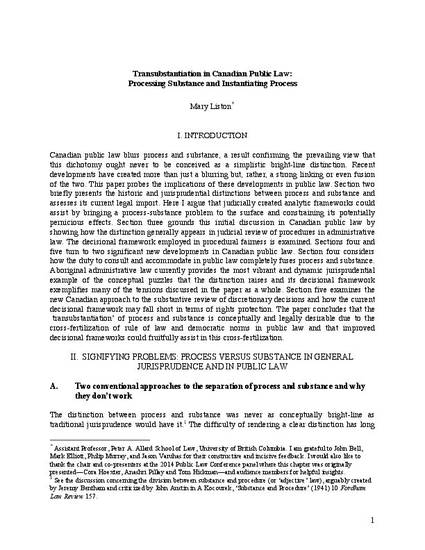
- public law; administrative law; judicial review; procedural review; fairness; substantive review; reasonableness; proportionality; discretion; analytic frameworks; judicial power; Aboriginal administrative law; duty to consult and accommodate; reasons; legitimate expectations; substantive fairness
Canadian public law blurs process and substance, a result confirming the prevailing view that this dichotomy ought never to be conceived as a simplistic bright-line distinction. Recent developments have created more than just a blurring but, rather, a strong linking or even fusion of the two. This paper probes the implications of these developments in public law. Section two briefly presents the historic and jurisprudential distinctions between process and substance and assesses its current legal import. Here I argue that judicially created analytic frameworks could assist by bringing a process-substance problem to the surface and constraining its potentially pernicious effects. Section three grounds this initial discussion in Canadian public law by showing how the distinction generally appears in judicial review of procedures in administrative law. The decisional framework employed in procedural fairness is examined. Sections four and five turn to two significant new developments in Canadian public law. Section four considers how the duty to consult and accommodate in public law completely fuses process and substance. Aboriginal administrative law currently provides the most vibrant and dynamic jurisprudential example of the conceptual puzzles that the distinction raises and its decisional framework exemplifies many of the tensions discussed in the paper as a whole. Section five examines the new Canadian approach to the substantive review of discretionary decisions and how the current decisional framework may fall short in terms of rights protection. The paper concludes that the ‘transubstantiation’ of process and substance is conceptually and legally desirable due to the cross-fertilization of rule of law and democratic norms in public law and that improved decisional frameworks could fruitfully assist in this cross-fertilization.
